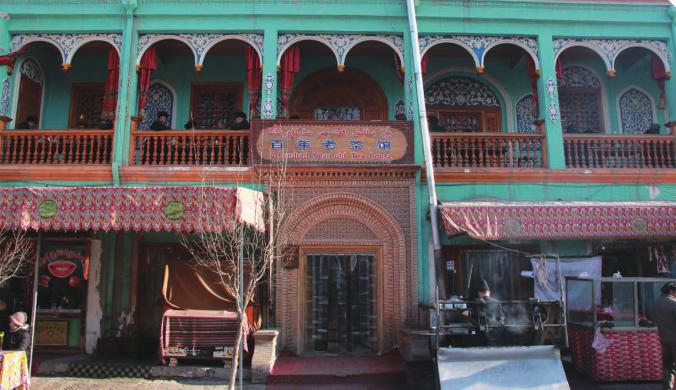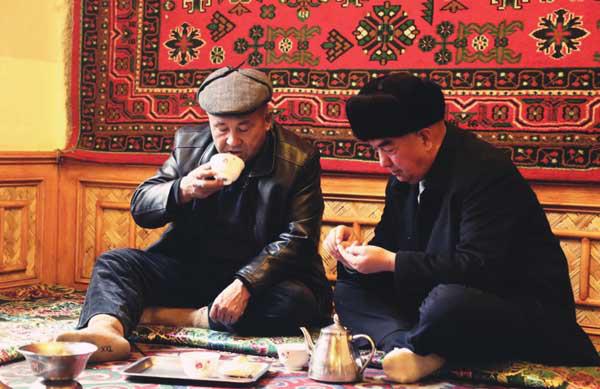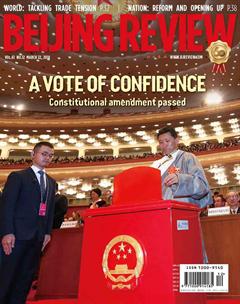A Time-Honored Brew
By Feng Zhuoyi & Li Fangfang
Turak Mamatimin, 58, rode a dozen kilometers on his scooter from the suburbs to downtown Kashgar, a historic city in northwest Chinas Xinjiang Uygur Autonomous Region, to have a cup of tea as part of his usual routine. He has been making the same journey to the same teahouse for 50 years with only one difference. He used to make the trip via donkey.
“It tastes better if you eat some nang (fl at bread) when you drink tea,” Mamatimin told Beijing Review. He has known this teahouse since he was a child, when he would follow his father there. “I would be bored if I didnt have tea here. There must be tea in my blood,”Mamatimin joked.
Many local tea enthusiasts regularly spend up to five hours at the teahouse, getting to know each other while sharing tea and snacks.
The Hundred Year Old Teahouse has become popular among tourist in recent years thanks to its role as the setting of the U.S. 2007 movie The Kite Runner. However, the teahouse has also suffered from operational difficulties in this period.
As suggested by its name, the teahouse has been witness to the citys change over the past century from one of the most bustling districts in Kashgar. Yet despite the challenges of time and changes in ownership, the original twostory wooden building has survived.
“Young locals usually go to those Westernstyle teahouses which serve not only tea but also coffee, snacks and food,” said Mamatkiram Mamat, the current owner who took over the teahouse from his father.
Mamat previously ran a business selling clothes and accessories for seven years, skeptical about the profitability of tea from a businessmans perspective. The teahouse sells only nang and tea, hardly enough to make running it a worthwhile financial venture, particularly in winter, when low temperatures demand the use of more fuel, which further depletes the teahouses profi ts.
But Mamat changed his mind when he heard customers complaining about bad service and sanitation at the teahouse then owned by his father.
“My face burned when I heard their complaints and thought to myself that I wouldnt tolerate such comments, turning it into a top teahouse if I was in charge,” Mamat said, recall- ing his experience of several years ago. The next time his father implored him to get involved with managing the teahouse, Mamat didnt refuse.
“As society develops, our lives are changing. Most traditional teahouses have closed because of poor management,” he said.
Besides his own development plans, the historic building is also included as part of a restoration program initiated by Kashgar City that subsidizes residents in the restoration of their houses as well as financing improved public infrastructure.
Under the auspices of the government policy, Mamat invested 100,000 yuan ($15,855) to repair the teahouse while ensuring that its traditional style was preserved. The teahouse began attracting more visitors, as well as the attention of the government. It was designated one of Kashgars must-see sites, with the government providing Mamat with additional subsidies to refi ne the teahouse.
However, Mamat didnt stop there. He also made improvements to the business model itself by diversifying the selection of teas on offer, adding medicinal Uygur varieties in addition to the original black, red and milk teas.
“Visitors suggested we should give them more choices in their comments. My son saw a business opportunity there and went to learn how to make tea with spices and medicine,”Mamats father said.
Before offering their new recipes to customers, father and son try their creations many times. They hope that these innovative varieties will bring more profi t to the teahouse.
Local residents prefer black tea, while almost all the tourists will order the Uygur medicinal tea flavored with cloves, ginger, white pepper and cardamom.
Mamat also posts updates via the Internet to attract customers, but he has resisted equipping his teahouse with WiFi. For many young people, it is a good opportunity to talk with “real”people and not to a screen. Since Mamats improvements, the teahouse has become a popular place for tourists to enjoy traditional culture at a relaxed pace.
Yet despite its recent success, Mamat is still looking for more ways to bring new ideas to his century-old teahouse; when spring comes, he is planning to add fl owers and fruits to enhance his secret tea recipes.


